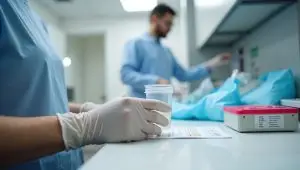Navigating the world of drug testing can be challenging, especially when it comes to understanding how various substances like CBD might impact the results. If you're a business owner, HR professional, recruiter, or job seeker in industries such as healthcare, transportation, and technology, it's essential to grasp the nuances of drug testing, particularly as they relate to CBD and other cannabinoids. This article will provide you with a thorough understanding of whether CBD shows up in drug tests and the implications for employment.
Key Takeaways
- CBD, while non-psychoactive, can potentially affect drug tests due to possible THC contamination, highlighting the importance for both employers and employees to understand CBD product risks.
- Most standard drug tests focus on detecting THC rather than CBD, but contamination in CBD products may trigger positive results, emphasizing the need for careful product selection.
- Drug tests vary by methodâurine, hair, blood, or mouth swabsâwith each having its own detection window and implications for assessing recent versus long-term drug use.
- Different industries have varying drug testing requirements, with stricter policies in sectors like healthcare and transportation due to safety and regulatory concerns.
- Employers and job seekers should prioritize transparency and communication regarding drug testing policies, with employers crafting fair policies and employees being informed about CBD-related risks and legal considerations.
Introduction
Drug testing is a staple in various industries, serving as a safeguard to ensure workplace safety and regulatory compliance. Whether it's healthcare, transportation, or technology, the primary aim is to maintain a drug-free environment that fosters productivity and reduces risk. As CBD grows in popularity for its wellness benefits, understanding its potential impact on drug tests becomes crucial. This is especially important for both employers, who set policies, and employees, who navigate testing requirements. In this article, we dive deep into the world of CBD and drug tests, laying out what you need to know to make informed choices about employment and health.

Understanding CBD and Drug Tests
Cannabidiol (CBD) is a compound found in cannabis that has gained popularity for its potential health benefits, such as reducing anxiety and pain. Unlike its cousin THC, CBD is non-psychoactive, which means it doesnât get you high. Under federal law, CBD derived from hemp is legal as long as it contains less than 0.3% THC.
Employers typically use several types of drug tests, including urine, hair, blood, and mouth swabs, each with varying detection capabilities. Urine tests are the most common, primarily because they are affordable and can detect drug use within a relatively long window of time. Hair tests can uncover drug usage over several months, while blood tests offer a shorter detection period but are less common due to their invasive nature. Mouth swabs are straightforward, often used to detect recent use.
When it comes to drug testing, the main focus is on THC, the psychoactive component of cannabis and the primary compound screened for. While CBD itself is not typically a target of drug tests, the concern arises from the potential of THC contamination in some CBD products. Understanding these basics is crucial for anyone navigating the challenges of drug testing in various professional settings.
Does CBD Show Up in a Drug Test?
Most standard drug tests are not designed to detect CBD itself. Research frequently indicates that pure CBD does not typically result in a positive drug test because these tests are predominantly aimed at finding THCâthe psychoactive compound in cannabis that can produce a "high." However, it's crucial to be aware of the risk of THC contamination in CBD products. Unfortunately, the CBD market isn't tightly regulated, leading to possible THC presence even in products labeled as "THC-free."
This contamination may occur during the manufacturing process, particularly if the product is extracted from plants grown for THC production. Trace amounts of THC might accumulate over time if one consumes CBD products regularly, potentially enough to trigger a positive drug test under certain testing thresholds. Interestingly, studies suggest that nearly 20% of CBD products could be tainted with THC above accepted legal limits. This highlights the importance of selecting high-quality CBD products from reputable manufacturers to mitigate this risk.
Other Cannabinoids in Drug Tests
When it comes to drug testing, not all cannabinoids are created equal. While CBD may not typically trigger a positive drug test, other cannabinoids like CBG (cannabigerol) present a different story. CBG is another non-psychoactive compound found in cannabis plants, often heralded for potential therapeutic benefits. Thankfully for those worried about drug tests, like CBD, CBG isn't usually on the radar in standard drug screenings. Most tests focus on THC, the cannabinoid responsible for cannabis' psychoactive effects, which can lead to a failed drug test. To date, routine tests don't typically search for CBG, leaving most users in the clear.
Now, let's tackle THC topicals. Thereâs a common belief that using lotions or balms containing THC could affect drug screening, but the reality is a bit more reassuring. Topically applied THC, like creams or ointments, interacts primarily with local receptors in the skin and generally doesn't penetrate deep enough to reach the bloodstream in detectable amounts for standard drug tests. The chance of testing positive due to topical application is slim. The skin forms an effective barrier, minimizing systemic absorption. So, unless someone is practically bathing in THC oil, a failed drug test from topicals remains highly unlikely. Always verify product content, but for everyday use, topicals shouldn't be a cause for concern.
Specific Testing Methods
Drug Mouth Swab Test
Mouth swab tests, also known as oral fluid tests or saliva tests, are a popular choice for drug screening due to their ease of administration and non-invasive nature. These tests typically detect recent drug use, focusing on substances consumed within the last 24 to 48 hours. A swab is either placed in the employeeâs mouth or wiped along the inside of their cheek to collect oral fluid. It's a straightforward procedure commonly used for pre-employment screening, random drug checks, and post-incident testing.
One of the key advantages of mouth swab tests is their ability to detect substances almost immediately after use. However, they are not as effective at identifying long-term use compared to other testing methods. Itâs important to note that these tests are primarily aimed at detecting THC and other illegal drugs, rather than CBD, although the risk of THC contamination in CBD products could result in a positive test outcome.
Regarding questions like "how long does it take to pass a mouth swab test", the detection window is generally short. In many cases, marijuana can be detected in saliva for up to 24 hours (potentially longer in frequent users), while other substances may have slightly varied timelines. This makes these tests particularly useful for detecting recent substance use.
Urine and Hair Tests
Two other commonly used drug testing methods are urine and hair tests, each with distinct characteristics and implications for employees and employers alike.
Urine tests are the most prevalent type of workplace drug testing due to their balance between cost-efficiency and reliability. They screen for a wide array of substances, and while they usually focus on THC, they are not designed to detect CBD unless specifically requested. Generally, urine tests can detect drug use from the past few days up to a week, depending on the substance.
In terms of financial implications, the cost of a standard urine drug screen can range considerably based on factors such as the panel size and the substances being screened for, with typical costs anywhere from $30 to $60 per test.
Hair tests, on the other hand, provide a much longer detection window, identifying drug use for up to 90 days due to drug metabolites being deposited in hair follicles over time. This method is less susceptible to short-term abstention or tampering and is often used when employers need to assess longer-term patterns of substance use. However, the cost for hair testing is significantly higher, often ranging from $100 to $150 per test, reflecting the complexity and depth of the screening process.
Both methods have their pros and cons, with hair tests offering a long-term view while urine tests are suitable for assessing relatively recent drug use. Understanding the costs and implications of each can help employers and employees navigate the landscape of drug testing options.
Employment and Legal Considerations
When it comes to drug testing, failing a test can have serious consequences for employment. Failing a drug test could lead to losing a job offer, getting fired, or facing disciplinary action. It may also disqualify you from certain roles. Check your employer's policies on retesting and appeals.
In the context of non-CDL (Commercial Driver's License) DOT physicals, employees in safety-sensitive positions might still face drug tests. While non-CDL roles do not have the same rigorous testing requirements as those with a CDL, employers may still mandate drug testing to comply with company policies or insurance requirements. Understanding these specifications is crucial if you're seeking such a position.
Pre-employment drug screens typically do not include alcohol testing unless required by specific job conditions. However, post-offer testing can occasionally include alcohol, especially for positions where operating heavy machinery is involved. This highlights the importance of knowing job-specific requirements and ensures that both employers and job seekers are aware of what the testing entails.
Job health screenings often include elements of drug testing, aiming to assess an individual's fitness for a specific role. These screenings can consist of tests for substance use, health questionnaires, and sometimes a physical exam. It's a comprehensive approach designed to ensure candidates meet the health standards necessary for the role while also incorporating drug testing as a component of broader workplace safety measures. Understanding these elements helps in preparing for what is a routine part of many hiring processes.
How CBD Can Impact Different Industries
Understanding the impact of CBD on various industries is crucial for both employers and employees, mainly because drug testing policies and their implications can vary widely. In the retail industry, where customer interaction and team agility are critical, CBD use might be less scrutinized. However, employers should remain aware of any potential CBD-related issues, such as sourcing products that inadvertently contain THC, which could complicate routine drug screening results.
In healthcare, where patient safety is the utmost priority, drug testing policies tend to be more stringent. Healthcare professionals could face serious consequences if THC is found in their system, even if it comes from a legal CBD product. Therefore, it's crucial for both employers and employees to be aware of the potential for THC contamination and to select trustworthy CBD suppliers to reduce this risk.
Transportation is another industry where CBD use is under tight scrutiny. Due to federal regulations and the inherent safety concerns of the field, even trace amounts of THC resulting from CBD products can lead to disqualification from duties. Drivers and operators must be selective about their chosen CBD products to remain compliant with these regulations.
Legal compliance is a significant consideration across all industries. Employers should align their drug testing policies with federal and state laws, and resources like the FTCâs Guidance and EEOCâs Guidelines can be invaluable. Being proactive and informed about CBD-related laws can help in tailoring policies that are fair and legally sound.
Ultimately, the key across industries is transparency and understanding. Employers should communicate clearly about their drug testing policies, and employees should stay informed about the potential workplace impacts of their personal CBD use.
Best Practices for Employers and Job Seekers
Employer Guidelines
Creating a balanced and transparent drug testing policy is crucial for maintaining workplace integrity while recognizing the growing use of CBD products. Start by clearly defining the objectives of your drug testing program. Is it primarily about safety, compliance, or both? Specify which substances you're testing for and under what circumstances tests will be conducted. It's wise to stay updated on local and federal laws about CBD use and disclosure requirements. Consider the difference between THC and CBD, and ensure your policy reflects a fair approach that differentiates between the two. Communication is keyâmake sure employees understand the reasons behind the tests and any potential consequences of positive results.
Employee Tips
For job seekers, being proactive is your best approach to navigating drug testing minefields. If you use CBD products, research them thoroughly. Look for reputable brands that provide third-party testing to ensure products are free from THC contamination. If you're facing a pre-employment drug test, consider disclosing your use of CBD to potential employers beforehand, and clarify if THC is a part of your regimen. Understanding the specifics of the testâwhether itâs a urine, hair, or mouth swabâcan help you prepare. Finally, stay informed about the legal landscape regarding CBD in your area to protect your rights and employment prospects.
Conclusion
Navigating the complexities of drug testing, especially about CBD, requires a clear grasp of the essentials. We've looked at how CBD might appear in drug tests, the legalities, and its potential impact on employment. Pure CBD generally won't cause a positive drug test, but THC contamination in CBD products is a crucial consideration with serious consequences.
For employers and job seekers alike, staying informed about drug testing policies is vital. Employers should aim to craft transparent and fair testing policies, acknowledging the widespread use of CBD for wellness. For job seekers, understanding these policies and the nuances of CBD will help them navigate the landscape more effectively.
In closing, transparency and communication are paramount. Open dialogue about drug testing practices not only fosters trust but also ensures that all parties are on the same page, thus reducing the likelihood of misunderstandings. As the world of wellness products evolves, so must our approach to drug testing, adapting with clarity and fairness.
Other Resources
- Grinspoon, P. (2020). Cannabidiol (CBD) â what we know and what we donât. Harvard Health Publishing. https://www.health.harvard.edu/blog/cannabidiol-cbd-what-we-know-and-what-we-dont-2018082414476
- Huestis, M. A., & Smith, M. L. (2007). Cannabinoids in hair: A review. Forensic Science International, 166(2-3), 157-166. doi: 10.1016/j.forsciint.2006.05.035
- Morgan, C. J., Freeman, T. P., Schafer, G. L., & Curran, H. V. (2013). Cannabidiol attenuates the appetitive effects of Î9-tetrahydrocannabinol in humans smoking their usual cannabis. Neuropsychopharmacology, 38(10), 2501â2510. doi: 10.1038/npp.2013.123
- Substance Abuse and Mental Health Services Administration. (2020). Workplace Drug Testing. https://www.samhsa.gov/workplace/resources/drug-testing
- Bonn-Miller, M. O., et al. (2017). Labeling Accuracy of Cannabidiol Extracts Sold Online. JAMA, 318(17), 1708â1709. doi: 10.1001/jama.2017.11909

GCheck Editorial Team
Meet the GCheck Editorial Team, your trusted source for insightful and up-to-date information in the world of employment background checks. Committed to delivering the latest trends, best practices, and industry insights, our team is dedicated to keeping you informed.
With a passion for ensuring accuracy, compliance, and efficiency in background screening, we are your go-to experts in the field. Stay tuned for our comprehensive articles, guides, and analysis, designed to empower businesses and individuals with the knowledge they need to make informed decisions.
At GCheck, we're here to guide you through the complexities of background checks, every step of the way.





